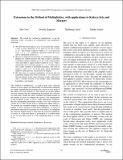Extensions to the method of multiplicities, with applications to Kakeya sets and mergers
Author(s)
Dvir, Zeev; Kopparty, Swastik; Saraf, Shubhangi; Sudan, Madhu
DownloadDvir-2009-Extensions to the method of multiplicities, with applications to Kakeya sets and mergers.pdf (327.7Kb)
PUBLISHER_POLICY
Publisher Policy
Article is made available in accordance with the publisher's policy and may be subject to US copyright law. Please refer to the publisher's site for terms of use.
Terms of use
Metadata
Show full item recordAbstract
We extend the "method of multiplicities" to get the following results, of interest in combinatorics and randomness extraction. 1) We show that every Kakeya set (a set of points that contains a line in every direction) in F [subscript q] [superscript n] must be of size at least q [superscript n}/2 [superscript n]. This bound is tight to within a 2 + o(1) factor for every n as q ? ?, compared to previous bounds that were off by exponential factors in n. 2) We give an improved construction of "randomness mergers". Mergers are seeded functions that take as input ? (possibly correlated) random variables in {0,1} [superscript N] and a short random seed, and output a single random variable in {0,1} [superscript N] that is statistically close to having entropy (1 - ?) ? N when one of the ? input variables is distributed uniformly. The seed we require is only (1/?) ? log ?-bits long, which significantly improves upon previous construction of mergers. 3) We show how to construct randomness extractors that use logarithmic length seeds while extracting 1 - o(1) fraction of the min-entropy of the source. Previous results could extract only a constant fraction of the entropy while maintaining logarithmic seed length. The "method of multiplicities", as used in prior work, analyzed subsets of vector spaces over finite fields by constructing somewhat low degree interpolating polynomials that vanish on every point in the subset with high multiplicity. The typical use of this method involved showing that the interpolating polynomial also vanished on some points outside the subset, and then used simple bounds on the number of zeroes to complete the analysis. Our augmentation to this technique is that we prove, under appropriate conditions, that the interpolating polynomial vanishes with high multiplicity outside the set. This novelty leads to significantly tighter analyses. To develop the extended method of multiplicities we provide a number of basic technical results about multiplicity of zeroes of polyno- mials that may be of general use. For instance, we strengthen the Schwartz-Zippel lemma to show that the expected multiplicity of zeroes of a non-zero degree d polynomial at a random point in S [superscript n], for any finite subset S of the underlying field, is at most d/|S|.
Date issued
2009-10Department
Massachusetts Institute of Technology. Computer Science and Artificial Intelligence Laboratory; Massachusetts Institute of Technology. Department of Electrical Engineering and Computer ScienceJournal
IEEE Symposium on Foundations of Computer Science
Publisher
Institute of Electrical and Electronics Engineers
Citation
Dvir, Z. et al. “Extensions to the Method of Multiplicities, with Applications to Kakeya Sets and Mergers.” Foundations of Computer Science, 2009. FOCS '09. 50th Annual IEEE Symposium on. 2009. 181-190. © 2009, IEEE
Version: Final published version
Other identifiers
INSPEC Accession Number: 11207147
ISBN
978-1-4244-5116-6
ISSN
0272-5428
Keywords
Extractors, Polynomial method, Randomness